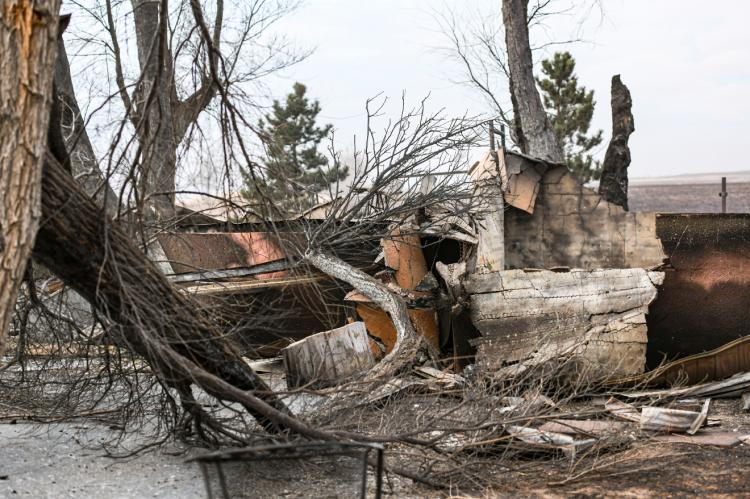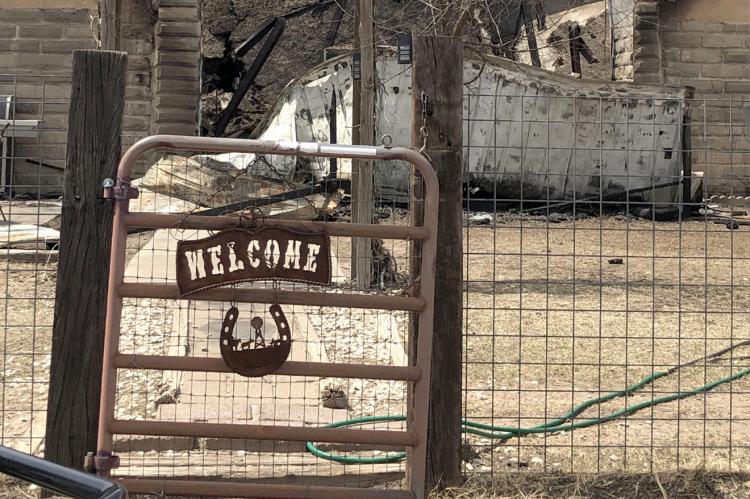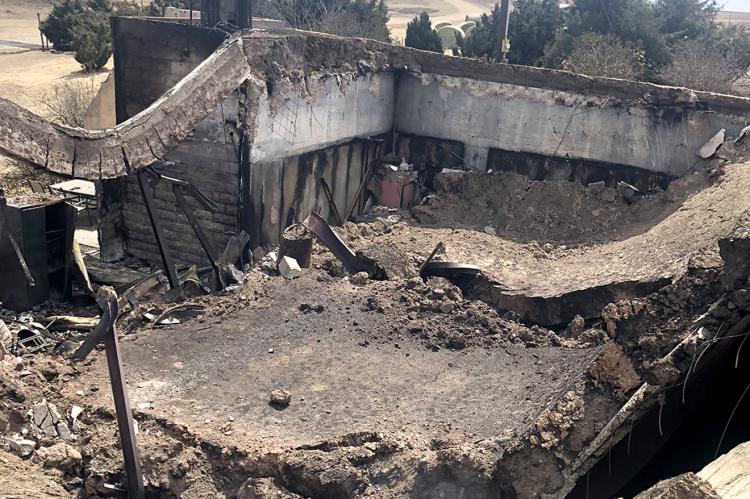Wildfire victims discover both loss and redemption in the ashes and wreckage
LARRY AND DELOIS RISLEY
Larry and DeLois Risley had evacuated their vehicles from their home on County Road 7 to his dad’s place in Wheeler after being notified of the advancing fire.
Firefighters helped water the perimeter of their house down on all four sides as a precaution. The couple stopped in Wheeler to get a drink for the return trip, and took the back roads home.
They were within about a quarter-mile of their home when they saw it go up in flames. All they could do was watch.
“Everything burned,” DeLois said. “Our kids and grandkids were here this weekend, helping us dig through the dirt and ashes. They found my senior ring and one of Larry’s wedding bands, but they were melted. Nobody else would know what they were.”
“That’s all that was found,” she said, quietly. “It was a total loss.”
Later, fire investigators told the couple they thought some embers had caught their wooden fence on fire and spread to the home. The home and its contents were uninsured.
DeLois said they had all of their important documents and guns stored in fireproof safes. They were destroyed, as well.
If there is a blessing to be found in this tragedy, it is that they were unharmed, and that all of their cattle and household pets were unharmed. “We had a bottle calf in back,” she said. “We got him to Miami that night, along with two feeder calves.”
“Lots of tears have been shed,” DeLois said. “It’s been just an emotional roller coaster. But we’re going to move forward.”
“The love of this community is … I just don’t know what to say.”
Larry had been raised in the home, and had lived there for the better part of his life. Their daughter Lori was 2 years old when they moved back in. “We’ve been here probably 38 to 40 years now,” DeLois said.
The Risleys have found temporary shelter in their RV, which is now parked at the site. They live there with all of their pets.
“Everybody is asking what they can do,” she said, “but right now, we’re kind of limited on space. But everybody has been so generous already. They have delivered hay and feed for the cattle, have dropped off gift cards and food for us.”
“Right now, we are doing good,” DeLois said, struggling to speak. “We are taking one day at a time.”
JOHN AND DIANA MCGARR
John and Diana McGarr’s rural home is a section line over from the Risleys, and while it is still standing, the Prairie Haven Bed and Breakfast, which stood nearby, and their greenhouse and chicken house were all razed by the flames.
While the B&B had been mostly idle since COVID hit, the garden and greenhouse have been an essential part of their lives. John points to one post-fire photo, saying, “That’s my garden. It was all raised beds.”
“The fire burned the post out from under the grapes,” he said, obviously checking off a mental inventory of what was no longer there. “The grapes will come back. The blackberries will come back. The asparagus hadn’t come on yet. But there was this whole bed of garlic. I had just finished mulching it.”
“The transplants that are under the lights are ready to be potted up and go someplace,” he said, “and I don’t have any pots to put them in.”
John wasn’t complaining, mind you.
That fire scorched the grass right up to the walls of his house, and burned a nearby 35- foot tree within a few feet of the top. But except for soot and smoke, their home still stood.
The McGarrs had been out of town when the Canadian River Bottom Fire reached their property. Tamara Julian called immediately and said, “I’ve got you a place to stay.”
When John and Diana arrived at their temporary house in town, the refrigerator was stocked with food.
Friends who own a restoration business—Canadian native Elizabeth [Kessie] Junell and her husband—contacted them immediately when they heard the news, and were quickly on-site and had begun cleaning the house. “They started air scrubbers and sprayed some stuff around,” John said. “Most of the damage was just the smell.”
They will clean the insulation in the attic, which is filled with soot, and the air ducts. “He answered a bunch of questions about what to do with the clothes, and the food that is in the kitchen,” John said.
Because the fire burned power poles and downed the lines, their home was briefly without electricity...but not for long. John Julian pulled a house generator out and hooked it up so all of the freezers would be okay.
The insurance company has already been there and advised the McGarrs to let them know how many loads of debris they had hauled, how much time they spent, and they will take care of it.
“We’ve been blessed beyond belief,” John said.
“You have some pretty good friends,” we observed.
“That, and we have God’s hands around that house,” John replied. “By rights, there shouldn’t be anything left.”
Both John and Diana know they don’t have to look very far to see others who were not so fortunate.
JIM AND BECKY BLACK
Jim Black spent five years building an underground house on land located between US 60 south of town and the railroad tracks. The shell of the home was constructed with huge I-beams and thick concrete walls. It was bermed on three sides, the roof covered with 2-1/2 feet of dirt, and a wooden porch in front.
The actual living quarters were inside of the seemingly indestructible structure.
If you were driving south on US 60, and knew what to look for, you could catch just a glimpse of it as you passed.
The fire that raged north on both sides of that highway last Tuesday took little note of the Blacks’ earth-sheltered home on its first pass. But what Becky called a fire tornado turned the flames back, and they caught the front porch, burning just inside the living room and melting the couches and ceiling fans. A microwave that was just around the corner was unharmed.
It was late, by then, and too dark to see. Jim retrieved some papers from his desk inside, and headed to the house in town, with plans to return at early light. “They thought the fire was out,” Becky said.
On his return Wednesday morning, though, he found the roof had collapsed, the I-beams were bent; the contents of their home irretrievable, and more likely, destroyed.
“It’s not real,” Becky said. “I have gone out there two or three times and just walked around and tried to look down in those holes. There’s nothing but ash and metal. I guess it just smoldered and burned.”
Jim had a cigar ashtray right to the lefthand side of the front door, sitting on top of the grill. “Not a mark on it,” she said. “But I wouldn’t dare crawl down in that hole, and I’m gonna bet there’s nothing left. I mean, just look at these massive I-beams—it just bent them like straws.”
Becky stops and thinks about the things that are now missing in that wreckage.
“All my canning stuff, my address book, my recipe book, where I kept my salsa recipe, the chow chow recipe that Lois Wright gave me, and she’s gone.”
The saddest loss, though, Becky said, is just the simple security “of walking in, putting my purse on the counter where it goes… or going into the kitchen to get my favorite knife out.”
Choking back tears, she calls it the security of normalcy. “I can’t pinpoint any one thing,” she said. “I thank God no one was hurt. I thank God no one was in there. But I’m the type of person that, I need to just flow.”
“You know, you can throw me a little something once in a while, but I need the routine,” she said. “That’s what I miss. You know, where do I set this when it had a place to sit in that house?”
“I could sit here and close my eyes, and I could go through every single room and tell you what was in every drawer, what was in every cabinet, what was sitting on the counter, all the way around, you know? A box of Kleenex, my food dehydrator. Jim had a coyote call machine sitting there on the counter.”
A barn out in front of the house was spared, but another one up close to the highway was gutted. “The tin is still standing there,” Becky said. “Jim and Bo built that, and they screwed so many screws in there, I guess that’s why it’s still there. A good hard wind, and it will collapse.”
The Blacks managed to move their horses to a pasture near Miami, and the cows were in a pasture on the back side that wasn’t burned. “There’s about 40 acres, and Jim’s been feeding them hay every day, Becky said. “If we could just get some rain and get into green grass, we would be OK.”
PHOTOS BY LAURIE EZZELL BROWN | THE RECORD




